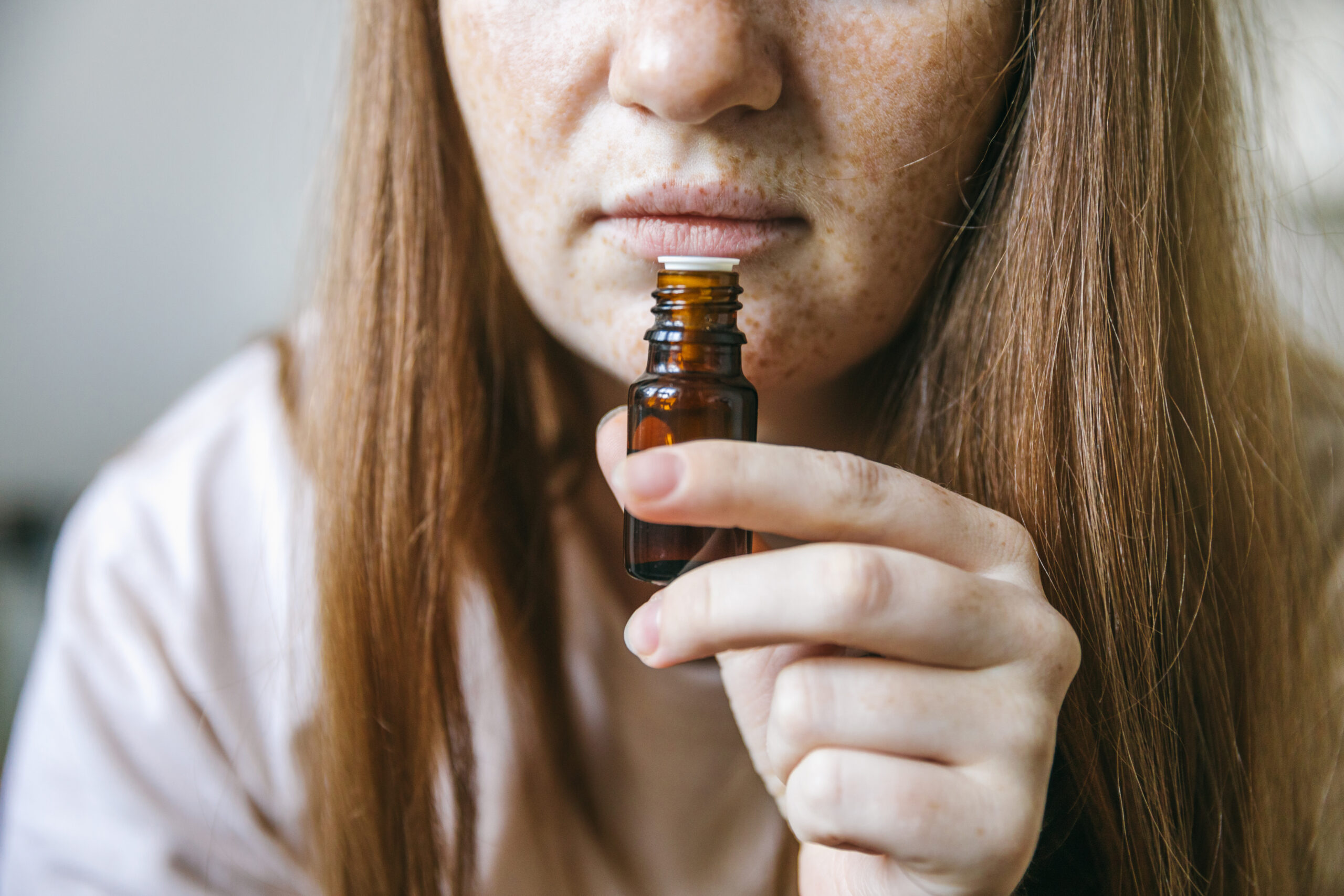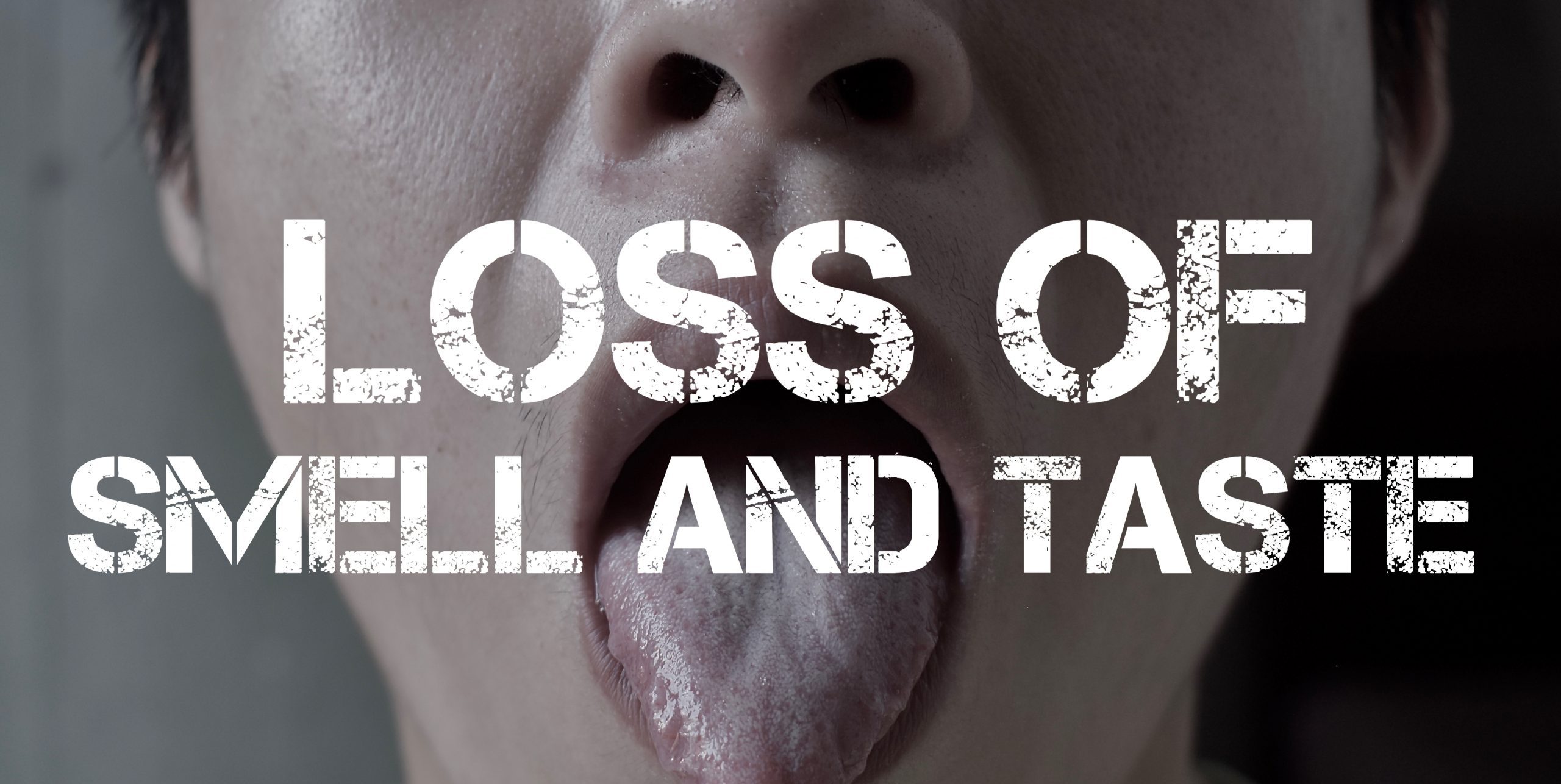Now live! RTHM Direct – simplified medication access for Long COVID, ME/CFS and related conditions. Check it out
When you think about early COVID cases, many people automatically connect COVID with the loss of taste and smell. Often thought of as a major sign of COVID, studies show that the loss of smell affects 41-61 percent of COVID-19 patients, while 38-49 percent experience taste loss. In most cases, these senses return to normal levels within a few months after acute COVID-19 recovery. However, many of those with Long COVID continue to experience the long-term loss or alteration of smell or taste for months or even years after their initial SARS-CoV-2 infection and recovery. So, how is the SARS-CoV-2 virus affecting the senses, what changes are people experiencing, and what can we expect in terms of treatment, remission, or recovery?
Common Chemosensory Disorders and COVID
Chemosensory disorders are any condition that causes a loss or distortion in your taste or smell. While messaging around the COVID pandemic highlighted the complete loss of smell and/or taste, SARS-CoV-2 has contributed to many different chemosensory disorders. These disorders can be broken down into those that affect your sense of smell and those that affect your sense of taste. Some originally thought that SARS-CoV-2 only affects the sense of smell; however, studies now show that, in some patients, it is actually affecting the sense of taste as well.
Your Sense of Smell
When it comes to chemosensory disorders, there are four different types that affect your sense of smell. These four conditions are determined by the extent to which your sense of smell is affected.
What Is Hyposmia?
Hyposmia is the reduction in the ability to detect smells. In this case, a person can still recognize smells. However, they may appear fainter in nature. When you get a cold or seasonal allergy and you experience swelling or congestion, hyposmia is common due to the inability of the nose to process smells as it normally would. In the case of Long COVID, hyposmia occurs in many as their sense of smell begins to return. Unfortunately, after a viral infection, such as SARS-CoV-2, cases of hyposmia can be permanent.
What is Anosmia?
Anosmia is the complete loss of smell. Similar to hyposmia, anosmia commonly occurs with the cold, flu, or a sinus infection, but typically resolves when you recover. As you age, the long-lasting loss of smell is more common in adults over the age of 50. In terms of COVID, anosmia affects as many as 30-80 percent of cases. However, most regain their sense of smell after about two weeks.
Unfortunately, a new research letter published in the JAMA Otolaryngology-Head & Neck Surgery journal estimates that as many as 1.6 million Americans have experienced a complete loss of smell for at least six months after acute COVID recovery. Unfortunately, when patients experience a long-term case of anosmia, the outlook is not very optimistic. After six months of smell loss, the complete recovery rate drops to less than 20 percent, with as much as 5 percent of cases resulting in permanent smell loss.
What Is Parosmia?

Parosmia is a condition that occurs when smells become distorted. As scent molecules enter your nasal cavity, the odor receptors transmit the incorrect scent messages to the brain, resulting in incorrect scent perception. Unfortunately, these smells are not usually pleasant, with many describing them as spoiled food or even rotting flesh.
Parosmia happens most often after a viral infection, meaning it is often considered a post-viral symptom. For those who experienced anosmia with their initial COVID, smells often begin to return but not in their normal state. This distorted sense of smell can be so bad that it causes nausea or vomiting and can affect the ability to eat. While there is currently no cure for parosmia, there are some treatments that can help.
What is Phantosmia?
Phantosmia is often referred to as olfactory hallucinations. With phantosmia, your olfactory system senses smell that is not there or is not detectable by the people around you. For example, those with this condition often smell a burning smell or the smell of a cigarette. While the majority of smells associated with phantosmia are unpleasant, they can also create pleasant odors. Phantosmia can occur as the result of head injury, sinus infections, Parkinson’s disease, and those with COVID and Long COVID.
Your Sense of Taste
While losing your sense of smell can affect your ability to taste the flavor of food, changes can also occur in the gustatory system that can affect your ability to taste the five main tastes that are sweet, salty, bitter, sour, and umami (savory). Originally thought to only affect the olfactory system, recent studies have shown that the SARS-CoV-2 virus can infect and replicate in the human taste buds, affecting your ability to taste.
What Is Ageusia?
Ageusia is the complete loss of the ability to detect the tastes of sweet, salty, bitter, sour, and umami (savory). Ageusia can occur with a number of conditions, including Sjogren’s, Crohn’s disease, dental work complications, injuries to the tongue, diabetes, cranial nerve lesions, and infections like COVID. While typically a rare condition, cases of ageusia have increased in patients with COVID and Long COVID. While the exact mechanism of damage is still unclear, two theories suggest that the SARS-CoV-2 virus may invade taste cells or the virus may bind to sialic acid receptors, in turn affecting the ability to taste.
What is Hypogeusia?
Hypogeusia is the reduced ability to sense taste. This is a common condition and is often an initial presenting symptom of COVID. In many cases, hypogeusia only affects the ability to detect one or two of the five key tastes.
What is Dysgeusia?
Dysgeusia is similar to phantosmia in that people with dysgeusia experience a persistent taste in their mouth that isn’t there. Common tastes associated with dysgeusia include a rancid or foul taste, extreme sourness or saltiness, or an overpowering metallic taste. This taste sensation often blocks out the ability to taste anything correctly. This condition can occur due to medications, vitamin deficiencies, and infections, such as SARS-CoV-2.

So Much More Than a Simple Loss of Senses
Many of us don’t give much thought to our sense of smell or taste and take for granted that it will always be there. In terms of long-term symptoms associated with Long COVID, the loss of taste or smell may seem insignificant and, if given a chance, many would offer to swap symptoms in a heartbeat. People just don’t understand how debilitating a loss of taste or smell can be.
In fact, in a 2011 study, individuals between the ages of 16-22 said they would rather lose their sense of smell than their laptop or cell phone. While many may joke that losing your taste would make eating healthy a lot easier (if chocolate tasted the same as kale, your body would appreciate the kale), the fact is that many of these conditions are so much more serious than a simple change in how you taste food or perceive your environment.
A recent study shows just how chemosensory disorders from SARS-CoV-2 and associated with Long COVID can have a significant impact on many areas of life.
Mental Health
The loss of smell and taste can have a negative impact on a person’s emotional well-being and quality of life. When food or environmental smells make you physically sick or no longer bring you pleasure, it can affect all aspects of your life, from eating out to socializing with family and friends. It can contribute to feelings of loneliness, fear, anxiety, and depression.
Safety

The loss of smell or taste does not only affect your quality of life, but it can also pose a risk to your health and safety. Your sense of smell and taste works as a built-in security measure. They allow you to sense the smell of smoke in the case of a fire or the smell of rancid food that has spoiled. When you lose these senses, you also lose the ability to detect these potentially dangerous signals.
Poor Nutrition
The loss of your smell or taste can also negatively affect your nutrition. While someone who has never experienced these conditions may assume it makes eating healthier easier, the fact is when you lose your sense of taste and smell, you often lose your appetite as well. We often turn to food for enjoyment and when your food lacks taste, what is the point of eating?
In addition, if you experience parosmia, the smell and taste of food can actually make you physically sick. Eating becomes very difficult when everything you try to eat makes you gag.
Whether you have a loss of appetite or an inability to find nutritious foods that do not make you feel sick, your body is not getting the nutrients you need. People often suffer from weight loss and vitamin deficiencies.
To learn more about how to eat with changes in your smell and taste, read Learning to Eat Nutritionally with Changes to Your Sense of Smell and Taste.
Affects Intimacy
You may not think that your sense of taste or smell would affect intimacy with your partner, but what if you have parosmia? When the smell of your partner’s breath smells like rotting flesh, it makes it very difficult to consider intimacy.
Are There Treatments for Chemosensory Disorders?
The majority of taste and smell loss resolves over time, however, treatment options are available for those with long-term loss. While not all treatment options are successful for everyone, these options do show promise. While we are still in the early days of Long COVID, there is hope that continued research will discover additional treatment options.

- Smell/Olfactory Training – utilizing essential oils, such as lemon, eucalyptus, rose, and clove, to essentially retrain your olfactory system and restore your sense of smell
- Oral, nasal spray, or nasal irrigation steroids – steroids work to reduce swelling and inflammation that may play a role in the loss of smell
- Stellate Ganglion Block – an injection of a local anesthetic in the neck to block sympathetic nerves to restore the sense of smell
- Topical platelet-rich plasma (PRP) – platelet-rich plasma helps to regenerate cells and promote tissue healing and has been shown to help regenerate cells in the olfactory epithelium. While injections have been tested, a less invasive option delivers the PRP in a dissolving sponge applied to the olfactory nerve.
If your Long COVID symptoms include long-term loss or changes in smell and taste, the team of physicians and researchers at RTHM is here to help. While we continue to learn more about the SARS-CoV-2 virus, our goal is to focus on treating your symptoms and improving your quality of life, including a focus on helping restore your smell and taste. To learn more about how RTHM can help you, sign up today.

Get updates
Join our mailing list



